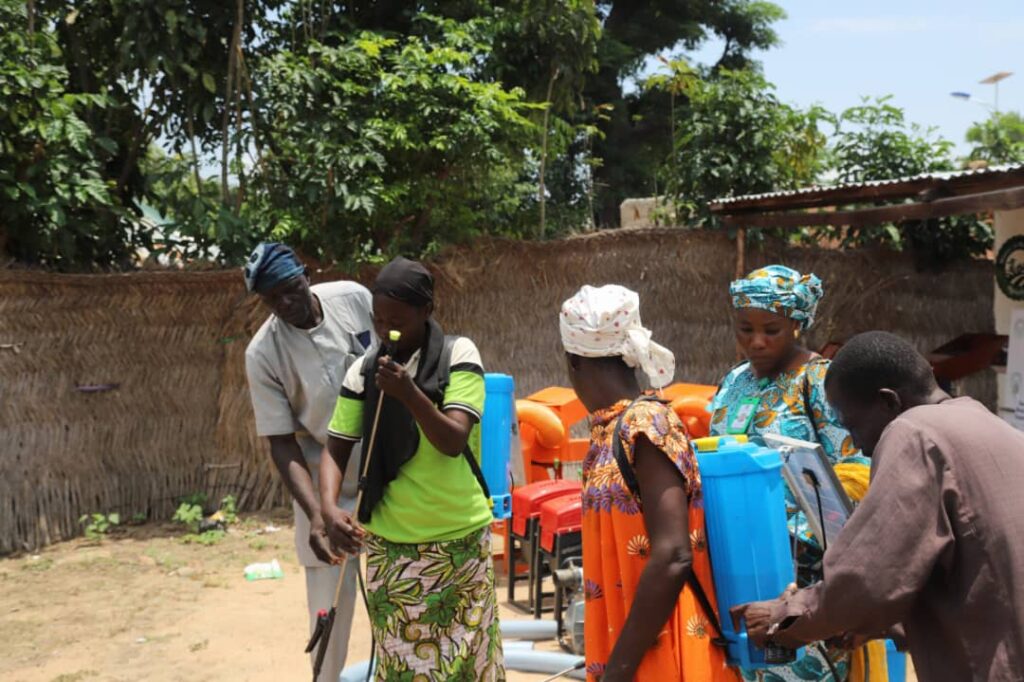In the farmlands of Old Demsa, Adamawa State, a smart climate Agriculture CSA revolution is unfolding.
For decades, women farmers here bent their backs over hoes, beat rice with sticks, and carried heavy baskets from field to home feeding communities while remaining invisible in Nigeria’s agricultural system.
Today, however, the sound of solar-powered threshers hums through the fields, and women who were once excluded from mechanisation now stand proudly as machine operators, mechanics, and service providers.
PROPCOM+, Halilco Foods Launch Instant Koko Production Line
For Grace Iorhea, the memory of harvest seasons is still vivid. “We threshed rice by hand, beat it with sticks, or used stones,” she recalls.
“Sometimes we lost nearly half of the grains, and by the time we finished, we were too exhausted to even go to the market.”
Her story mirrors the reality of millions of women who make up over 60% of Nigeria’s agricultural workforce.
Despite their central role in food production, women have long been sidelined in land ownership, access to credit, and modern farming tools.
Tractors and heavy machines were built for men, trapping women in cycles of exhausting manual labour.
At the heart of this transformation is Women in Mechanized Agriculture (WIMA), a women-led association determined to break gender barriers in farming.


“We group women into cooperatives and train them as Mechanised Service Providers (MSPs),” explained Ummi Umar Gaya, WIMA’s Coordinator for Adamawa State.
Jigawa Farmers Fear Missing Wet Season Farming Due to Fertilizer Hike
“Each group has operators and even mechanics. It makes their work easier and ensures sustainability.”
Since March 2025, WIMA has directly empowered over 50 women in Old Demsa and reached more than 1,000 farmers across three local government areas in Adamawa.
WIMA’s impact has been strengthened by Propcom+, a UK-funded programme targeting the livelihoods of 3.79 million smallholder farmers by 2030—with at least half being women.
Through this partnership, women in Old Demsa now access climate-smart technologies such as solar-powered irrigation pumps, threshers, knapsack sprayers, and vegetable dryers.
Propcom+ covers 70% of equipment costs while WIMA contributes 30%, making tools affordable and sustainable.
Even more transformative, women receive direct training from manufacturers, enabling them to operate machines, deliver services, and earn new incomes as recognised mechanised service providers.
For Iorhea, watching her first rice thresher at work was life-changing. “What used to take three days of back breaking labour, I completed in a few hours,” she said, smiling.
Another farmer described how solar-powered sprayers not only saved time but also reduced her exposure to harmful chemicals.
Nesther Nibza, President of the Moreno WIMA Cooperative Association, captured the shift:
“We used to be left out when people talked about mechanisation. Now, we are the ones teaching others how to use these machines. Climate-smart tools are not just machines; they are keys that unlock the strength of women farmers.”
Still, the women are ambitious. Nibza dreams of owning a power tiller and grinding machine. “With just one power tiller, I can finish 50 hectares in a week,”
The ripple effect is spreading beyond Old Demsa. Mr. Jahson Wunamir, Project Manager of CEASEL in Guyuk, said 70 women farmers and their clusters have benefitted from the initiative, allowing them to scale up production and access wider markets through out-grower schemes.
For some, the results are already visible. Mrs. Mariya Johnson, 50, from Banjiram, explained that
“Last dry season I cultivated one hectare, but with these tools, I expanded to three hectares.”
Similarly, Mrs. John, a 40-year-old farmer in Demsa, said the new inputs have eased farm work and improved yields.
For the community, the benefits go deeper than improved harvests.
Chief Ohel Swade of Old Demsa expressed gratitude: “This intervention has brought progress and dignity to our women.”
Indeed, the story of Adamawa’s women farmers is more than a tale of machines.it is about dignity, visibility, and rewriting history.
From hoes to harvesters, from invisibility to leadership, these women are proving that empowering female farmers is not just about food security; it is about equity, resilience, and sustainable growth.
As Nigeria grapples with the twin challenges of climate change and food insecurity, women like Grace Iorhea and her peers in WIMA stand as living proof that when women farmers are given the right tools, they don’t just feed their families they feed the future.





